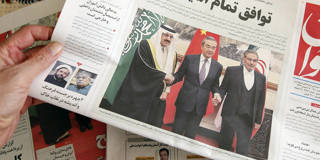After decades of heeding Deng Xiaoping’s advice to “hide its strength, bide its time, never take the lead,” China has apparently decided that its moment to step into the global spotlight has arrived. The US must act urgently to restore its influence, particularly in the Middle East.
MADRID – Perhaps no image better captures the shifting dynamics in the Middle East than that of Ali Shamkhani, the secretary of Iran’s security council, and Musaad bin Mohammed Al Aiban, Saudi Arabia’s minister of state, shaking hands in Beijing, with China’s top diplomat, Wang Yi, smiling between them. The officials were celebrating a China-mediated deal restoring diplomatic ties between the two rivals. In the process, China solidified its reputation as a global powerbroker and underscored the extent to which America’s regional role has been diminished.
The surprise deal was born largely of necessity. For Iran, which has long been deeply isolated by US sanctions, the détente represents a much-needed economic lifeline at a time of deepening popular unrest. For Saudi Arabia, it offers the prospect of a respite from the devastating proxy war that the country has been waging against Iran in Yemen.
But while both sides had their reasons for pursuing rapprochement, it was China that made it happen. After decades of heeding Deng Xiaoping’s advice to “hide its strength, bide its time, never take the lead,” China has apparently decided that its moment to step into the global spotlight has arrived.

MADRID – Perhaps no image better captures the shifting dynamics in the Middle East than that of Ali Shamkhani, the secretary of Iran’s security council, and Musaad bin Mohammed Al Aiban, Saudi Arabia’s minister of state, shaking hands in Beijing, with China’s top diplomat, Wang Yi, smiling between them. The officials were celebrating a China-mediated deal restoring diplomatic ties between the two rivals. In the process, China solidified its reputation as a global powerbroker and underscored the extent to which America’s regional role has been diminished.
The surprise deal was born largely of necessity. For Iran, which has long been deeply isolated by US sanctions, the détente represents a much-needed economic lifeline at a time of deepening popular unrest. For Saudi Arabia, it offers the prospect of a respite from the devastating proxy war that the country has been waging against Iran in Yemen.
But while both sides had their reasons for pursuing rapprochement, it was China that made it happen. After decades of heeding Deng Xiaoping’s advice to “hide its strength, bide its time, never take the lead,” China has apparently decided that its moment to step into the global spotlight has arrived.